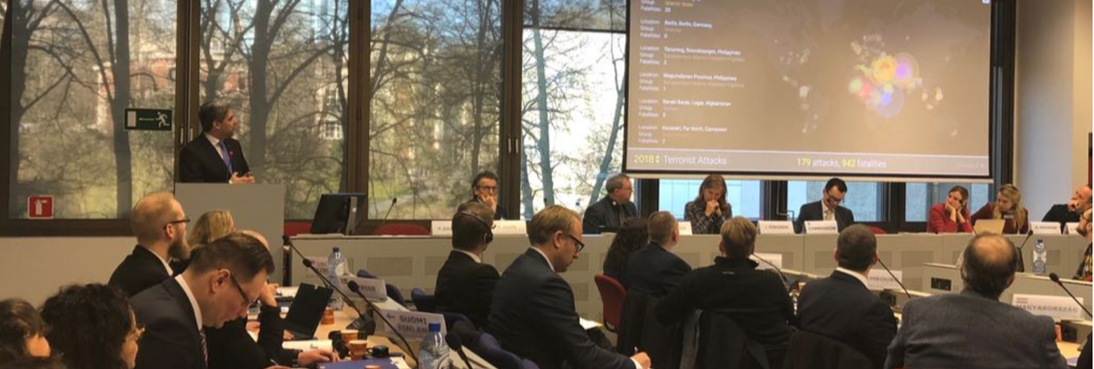|
BEST PRACTICE 2020
The RAN Collection Expert Review (DG Migration and Home Affairs) Best practices and lessons learned from 2020 In 2020, the RAN Collection started to differentiate between ‘inspiring’ and ‘best’ practices to raise awareness about the increasing necessity of evaluating P/CVE interventions. To date, 14 practices have taken part in the review with a positive outcome and are now labelled as best practice in the RAN Collection. After being considered an "Inspiring" practice for some time, the R2PRIS practice (methodology, assessment instruments and training materials) was selected as one of the 14 "Best Practices", out of more than 226 reviewed practices. |
Citations
The R2PRIS methodology, related training and assessment instruments has been cited in several official and scientific publications.
The R2PRIS methodology, related training and assessment instruments has been cited in several official and scientific publications.
The RRAP Radicalisation Risk Assessment in Prisons toolsetFollowing a multi-level radicalisation prevention approach comprising three risk assessment tools, it targets all types of extremism. The toolset focuses on signalling risk and vulnerability in the general population rather than in charged or convicted terrorist offenders and comprises the following tools:
|
Multi-level in-Prison Certification TrainingA capacity building programme developed as the result of concerted transnational cooperation between academia, private sector research, correctional sector representatives and practitioners, that aims both to certify professionals at different levels of the prison administration (prison governors, frontline officers and technical staff, internal trainers and facilitators) in the use of the tools that will enable them to identify risks, and screen and assess inmates that may at risk of becoming radicalised, but also to train other colleagues in the use of these tools.
|
|
R2PRIS Radicalisation Prevention in Prisons seeks to reduce radicalisation and extremism inside prisons by enhancing the competences of frontline staff (correctional officers, educational staff, and psychologists, social workers) to identify, report and interpret signals of radicalisation and respond appropriately. Bringing together international experts in the field of radicalisation, research institutions, private partners and national prison administrations, the R2PRIS project offers an innovative training programme for prison staff on how to recognise and prevent the process of radicalisation inside prisons.
|
R2PRIS On-line course
|
|
|
R2PRIS at DG Migration and Home Affaires RAN Collection of inspiring practices.
The R2PRIS Radicalisation Prevention in Prisons project has been included in the DG Migration and Home Affaires 2018 RAN Collection of inspiring practices – Prison and Probation Interventions. The RAN Collection of Approaches and Practices presents a set of seven practitioners’ approaches in the field of prevention of radicalisation, each of them illustrated by a number of lessons learned and selected practices and projects. The Collection is a practical, evolving and growing tool, where practitioners, first liners and policy makers may draw inspiration from; find examples adaptable to their local/specific context; and identify counterparts to exchange on prevention experiences. As a work in progress, the RAN Collection is continuously being adjusted and enhanced with new practices from EU/EEA Member States. You can access the Collection of inspiring practices here |
|
R2PRIS as one of the EC actions referred at the "Communication from the Commission to the European Parliament, the European Council and the Council Eighth progress report towards an effective and genuine Security Union"
The R2PRIS Multi-level In-Prison Radicalisation Prevention is referred as one of the European Commission actions of the European Action plan to fight terrorism (state of play of implementing the Action Plan for strengthening the fight against terrorist financing) at the Communication from the Commission to the European Parliament, the European Council and the Council Eighth progress report towards an effective and genuine Security Union (Brussels, 29.6.2017 COM(2017) 354 final), annex I, page 5. |
R2PRIS at the European Conference on Radicalisation Prevention in Prisons.
The R2PRIS project has been presented at the European Conference on Radicalisation Prevention in Prisons, hosted by DG Justice of the European Commission and the Bulgarian Presidency of the European Union, with the presence of Comissioners Věra Jourová (Justice) and David King (Security) and more than 140 participants representing more than 30 jurisdictions. You can see the photos of the event here and video of the initial presentation of Commissioner Jourová here. |
Certification & training
Lisboa, Portugal (in English)
HV Helicopter View - prison governors | FBOG Frontline Behavioural Observation Guidelines - frontline staff | IRS Individual Radicalisation Screening - technical staff
HV Helicopter View - prison governors | FBOG Frontline Behavioural Observation Guidelines - frontline staff | IRS Individual Radicalisation Screening - technical staff
Lisboa, Portugal (in English)
CIRA Critical Incidents Readiness Assessment - prison management
CIRA Critical Incidents Readiness Assessment - prison management
Online certification and tutored courses
The Corrections Learning Academy is an online training platform with real-time and self-paced programmes.
The Corrections Learning Academy hosts the R2PRIS online tutored certification training.
The Corrections Learning Academy hosts the R2PRIS online tutored certification training.
Related projects
INDEED Comprehensive approach to preventing and countering radicalisation based on a universal evidence-based model for evaluation of radicalisation prevention and mitigation |
HOPE Holistic
|
|
INDEED aims to strengthen the knowledge, capabilities and skills of preventing violent extremism (PVE) / countering violent extremism (CVE) and deradicalisation within first-line practitioners and policymakers in designing, planning, implementing and evaluating initiatives in the field through an evidence-based approach. INDEED builds from the state-of-the-art, utilising the scientific and practical strengths of recent activities – enhancing them with complementary features to drive advancements and curb a growing rise of radical views and violent behaviour threatening security.
|
Strives to create a network that supports continuous training and knowledge sharing in the Balkan, Southern and Eastern European countries, a European learning hub on Radicalisation. A network of training and research organisations, academies, prison and probation systems, that can intervene on radicalisation prevention and disengagement but also to improve the transition process between prison and/or probation systems and the community for those at risk of radicalisation or who have been radicalised. It will achieve this outcome by promoting a holistic radicalisation prevention initiative focusing on offenders, front line staff and community organisations.
|
R4JUST Radicalisation Prevention Conpetences' Development for Justice ProfessionalsAims to prevent and reduce the risk of radicalisation and violent extremism inside prisons by exploring a multi-sectoral approach, intending to enhance the competences of prison staff (RRAP Toolset – Multi-level radicalisation approach towards governors, frontline staff and technical staff), probation staff (e.g., probation officers/supervisors, psychologists), as well as judges and prosecutors while fostering criminal and judicial multi-sectoral cooperation and networking on countering and preventing radicalisation.
|
CEDAR Continuing Education Against RadicalisationEuropean-level efforts to prevent radicalisation and violent extremism involve the need to train professionals also in the education sector, especially educators such as university professors, juvenile detention centres educators, as well as associations working with vulnerable youngsters. Despite numerous recommendations and laws aimed at characterising and banning the extremist discourse that leads to violence, few specifically European tools have been developed to date. The CEDAR project aims to fill that gap by training and improving the practitioners’ skills in the field of radicalisation and extremism in educational and university settings, by supporting them with the necessary competencies towards risk identification and prevention.
|
INTEGRA Integrated Community, Probation and Prison Services Radicalisation Prevention ApproachStrives to improve the transition process between prison and/or probation systems and the community for those at risk of radicalisation or who have been radicalised. It attempts to achieve this outcome by promoting a holistic radicalisation prevention initiative, focusing on offenders’ skills development as well as on the capacity building of frontline staff and organisations.
|
WayOut Integrated Exit Programme for Prisons and ProbationAimed at building a common framework to evaluate exit programmes along with the development of an innovative and integrated programme based on proven effectiveness approaches. It will improve and facilitate the implementation of exit programmes across the criminal Justice system, namely in prison and probation settings responding to one of the EU’s security concerns: the problem of radicalisation leading to violent extremism.
|
PRACTICIES Partnership against Radicalisation in Cities
Mobilises networks of European cities and experts to better understand the human roots of violent radicalisation and to characterise these processes starting by their origins and to build concrete tools and prevention practices. This project relies on the cooperation of experience in the field of urban security in cities and expertise of national structures to fight terrorism (from different countries involving government and law enforcement agencies, municipalities, research institutions and private organisations).
|
The R2PRIS project is co-financed by ERASMUS + programme ( KA2 - Strategic partnerships for adult education). ERASMUS + is the new EU programme for Education, Training, Youth, and Sports (2014-2020).
This website has been accomplished during the project “Radicalisation Prevention in Prisons” - 2015-1-PT01-KA204-013062 (R2PRIS), implemented with the financial support of the European Commission through the Erasmus + Programme. This publication reflects the views only of the author, The Portuguese National Agency ERASMUS+ Education and Training and the European Commission cannot be held responsible for any use which may be made of the information contained therein. © Developed by IPS_Innovative Prison Systems
|






